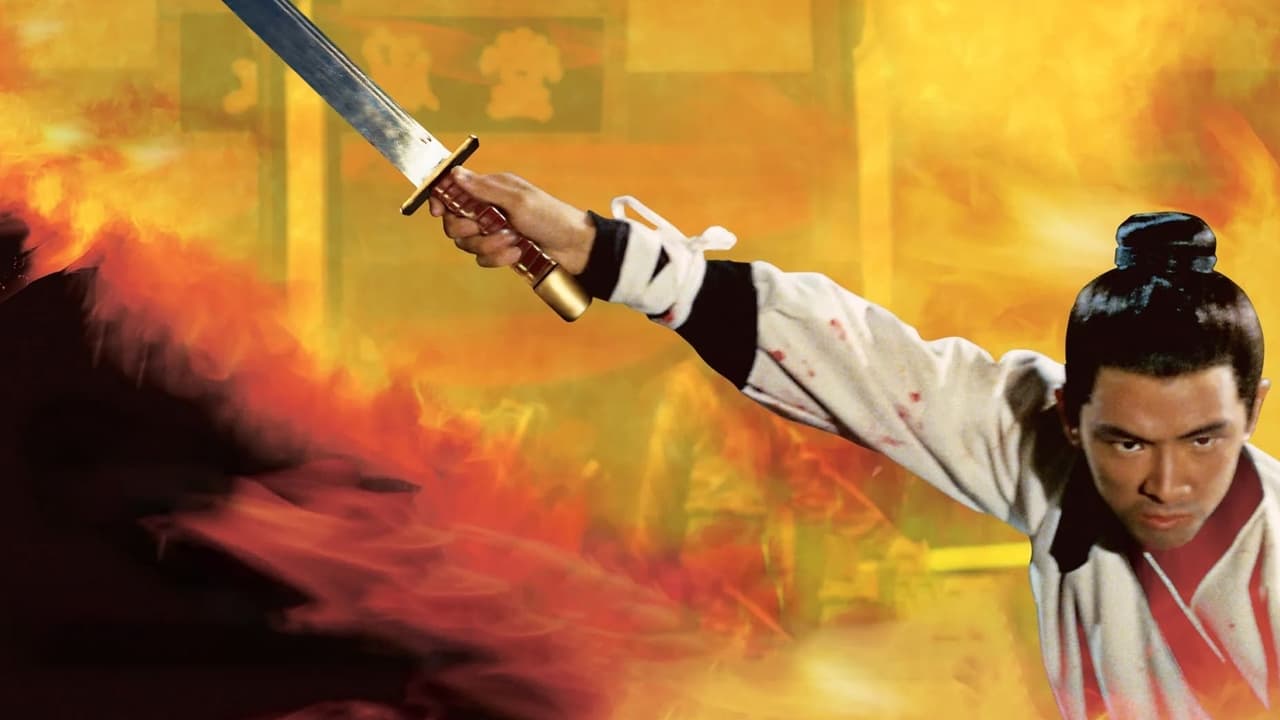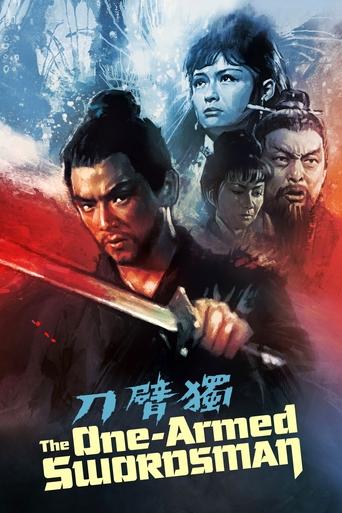



This is How Movies Should Be Made
just watch it!
All of these films share one commonality, that being a kind of emotional center that humanizes a cast of monsters.
View MoreGreat movie. Not sure what people expected but I found it highly entertaining.
View MoreA lower caste servant gives his life in defense of his master, Qi, master of the Golden Sword school. Qi promises the dying man that he will raise his son; the boy retrieves his father's broken sword (which will prove pivotal later), and grows up to be Wang Yu. Belittled for being the son of a mere servant, the adult Yu decides to leave the school- but Qi's daughter, whose advances Yu has rebuffed, takes it upon herself to amputate his right arm in retribution. This impromptu surgery takes place in a snow-bound forest and is foreshadowed by the chopping off of a tree limb. It's a remarkably bloodless affair, and Yu staggers away to throw himself off a bridge- but he falls, instead, on the (conveniently) passing boat of Miss Xiaoman, who nurses him back to health. Meanwhile, Smiling Tiger (whose smile is deceptive) and Long-armed Devil (whose whip and short spears are "extensions" of his reach, one presumes) have decided to hunt down and kill all of Qi's Golden Sword students. The bad guys have developed a "sword-lock" weapon that, coupled with the use of a dagger, makes them night unbeatable. Yu, meanwhile, gets "better," though he's remarkably proficient with his left hand for a man used to fighting with his right. (He even develops Chi to the point where he can push air (?) hard enough to trim limbs from a tree and leave his palm-print in a tree stump. These two incidents happen back-to-back and both involve tree LIMBS and a tree STUMP. One can only wonder if the symbolism was intentional by director Chang Cheh. My guess would be that it WAS.) All of the foregoing leads to a final confrontation at the Golden Sword school that should not be missed.
View MoreThis is a pretty original and refreshing genre movie and not just for its time. Of course the concept alone of having a one-armed swordsman as the main character in a Hong Kong martial arts movie is already original and refreshing on its own. But also the whole handling and development of the storyline is great and refreshing. It's not just some mindless chopping in this movie.I must admit that in this case I liked the 1995 remake "Dao" even a better as movie. It had a better storyline, better emotions, better villains, better fight sequences and a better overall style. Nevertheless this movie is still a better one than "Dao" is. Qualitivly the story is a better told one and of course simply just because this movie was first and therefor automatically is also more original.It's already an outdated and somewhat silly looking movie. It's a movie with some fake looking sets and beards and some horrible added sound effects. Also the blades and blood are obvious fakes. The movie on its own is pretty violent and graphic but because of its fake look its nothing too shocking or impressive. It also is not like its laughable it just makes the movie look outdated.The fights also aren't ever really long one's but they are really well choreographed and makes it very enjoyable to view for the fans of the genre. Toward the end the action of course starts to kick in even more. It's also true that the movie gets even better by then.This just is no Hollywood movie, so the editing and camera-work might seem a bit off to some but this is of course all part of the Asian style of film-making. Not that I'm a particular great fan of it all though. In some things Hollywood movies are just better, mostly when it comes down to the technical things behind film-making.A great and original movie within its genre!9/10http://bobafett1138.blogspot.com/
View MoreGiven the bad reputation of Chinese martial arts films in general, plus the undeniable fact that many of these - including this one - use genre conventions originally developed for the popular stage (what has been called "Chinese Opera" is actually more analogous to American Vaudeville), it is only with considerable effort that an admirer if these films can persuade Americans to watch these movies, let alone appreciate them fully. But the point really is, that the directors of these films use what they have to portray the culture in which they live in a manner as completely cinematic as can be found in any national film tradition.All this is a warm up to this: The One-Armed Swordsman is as masterful a film as Kurosawa Akira's Yojimbo.I make this specific comparison because each film was made within a genre to which the film contributes genre-shattering innovation, while at the same time maintaining certain essential conventions that keep it safely within the genre. Thus Kurosawa's renegade ronin is a tough, cynical, manipulator of the various villains of the film, in a way even the most tragic hero of the Japanese samurai film (chambara) of the time could never be; nonetheless, he still manages to kill everyone at the end, much like all the other chambara heroes.Similarly, Chang Cheh's One-Armed hero follows genre convention by performing super-human feats of skill (like leaving the imprint of his hand on a rock with a single blow), but just as a character, he is completely new.The typical wu xia film of the time generally had an aristocratic hero; if he had no personal problems to deal with, he always wore white. If he had personal problems, he would drink heavily and dress like a mendicant monk. He was in utter thrall to whatever worthiest female was in his immediate vicinity; his cause was always to uphold the right, protect chastity, and further the well-being of the Chinese people as a whole. His one real defect (as a "type") was that he really liked fighting, which usually got him into trouble with those with similar enjoyments.Chang Cheh's Feng Kong (as played by Wang Yu in what is his finest role) is not an aristocrat, but an orphaned son of a servant; he doesn't wear white, he wears black; remaining loyal to her father (his former teacher) he grows to hate the young lady who chopped off his arm (I certainly would) and grows attached to the dead warrior's daughter (with whom he sleeps without marriage) only after she has nursed him back to health - but he remains determined to control his own fate nonetheless. The future of the Chinese people doesn't interest him. Eventually, he abjures fighting and goes off to become a farmer.As can be discovered from various interviews, Chang Cheh, in filming what is still his most completely realized vision, was perfectly aware that he was making such innovations. In fact, in terms of traditional Chinese culture alone, The One-Armed Swordsman comes across as a radical Confucian demand for recognition of merit above social status; and of the need for social stability over and against any desire for personal revenge.Furthermore, Chang Cheh pulls this off in a manner utterly consistent with the social trends of the 1960s - Feng Kong is portrayed as an "angry young man" - the representative of an entire generation fed up with many of the myths of the old culture to which they have been indoctrinated. He is brazen, energetic, honest, and more than a little suspicious of old prejudices (which have never favored him anyway). And having been told that he was not "born worthy", he sets out to proves that he can learn self-sufficiency without the benefit of institutional education. He doesn't need to start a revolution - he IS a revolution.Of course, if the general quality of the film as a whole were not utterly top-notch, this message would be meaningless. But the camera-work, supporting performances by the other actors, staging and direction, and most of the editing are all "world-class" - as good as anything coming out of Hollywood that decade, and better than any Hollywood film of the decade's latter half.Let the genre conventions be what they are, and pay respect to one of the best films of its type - and perhaps one of the finest films ever made, world-wide.
View MorePlotwise this is relatively standard fare. Student suffers a personal defeat , goes into recovery and training mode, then redeems himself.My beef with this movie was the Qi/Chi sword style. The evil villain devises a special technique, complete with a custom sword to defeat the Qi sword style. And the Qi family is completely unable to defeat this new technique. They push forth like lemmings, each one dying in the same fashion as his predecessor. When their self preservation instinct raises a notion to perhaps team up and take advantage of their 20 - 3 numbers to defeat their enemies, the main villain chides them to keep fighting one on one. As self preservation once again takes a step back, they continue fighting and dying one at a time, until the timely arrival of our handicapable hero who uses his new style to quickly dispatch the villains.If our hero kept his arm, he no doubt would have died too, as the Qi sword style is apparently completely incapable of improvisation. This really killed the enjoyment of the movie for me, as by the time the 10th Qi student died IN EXACTLY THE SAME FASHION, I would have figured that someone would have tried something new. At no point did Bruce Lee's critique of the rigidity of Chinese martial arts ring more true.If this particular problem does not bother you as much as it did me, then this can be a quite enjoyable late 60s Shaw Brothers experience. But if seeing fight after fight resolve itself in exactly the same fashion begins to grate on you, then perhaps look elsewhere.
View More